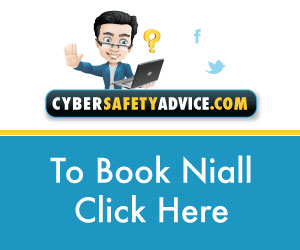Guest blog by Amy Williams
Do you remember life before high speed Internet and wi-fi?
In the good old days we were connected by letters and phones corded to a wall. Those oddities of yesteryear are practically foreign objects for today’s generation of children. This group of digital natives have been raised in a connected society without cords.
It should come as no surprise, that this group of millennials have embraced the Internet, Social Media, Apps, and all the other trappings technology offers. Knowledge and communication are instantly available with a swipe or tap of a finger.
Unfortunately, hidden deep inside the lure of whirring electronics are a few lurking dangers. The Internet’s dark side can leave people vulnerable to cyber bullying, online predators, identity theft, and more. Personal information and images can be used to fuel years of pain and heartbreak.
Image Courtesy of Shutterstock.com
Ireland’s Predicament
Unfortunately, Internet safety affects all countries and demographics. Ireland, similar to Great Britain and The United States, is starting to notice how the Internet can traumatise it’s population.
Here are just a few statistics to illustrate popular Irish concerns about unseen dangers of the Internet:
- 1 in 7 children have experienced cyber bullying in the last 3 months.
- In 2014, Ireland had high rates of cyber bullying compared to the rest of Europe.
- 83% of parents are concerned about children viewing inappropriate Internet content.
- 74% of adults check browser history, emails, texts, messages, and other records to see how their teenager is using the Internet.
- 86% of Irish parents believe the Internet is vital for education.
- It appears that almost half of parents feel that their child is trustworthy to use the Internet safely.
7 Tactics To Encourage Internet Safety
Securing the Internet can be intimidating and frightening for many people. Thankfully, society is able to impart knowledge to keep families safe and avoid pitfalls commonly associated with the Internet.
Here is a list of 7 tools and strategies to implement today:
Beware of shadow profiles. People and teens might create multiple profiles on Social Media sites. Typically, one profile will be clean and appropriate for appearances; while a different profile is used for vulgar or harassing comments. Only accept invitations or friend requests from real people you actually know.
Only allow Internet and Social Media in common living space. Set clear boundaries to keep the Internet out of bedrooms, bathrooms, or private areas. Chances are children will behave better if a parent might view what they are posting.
Monitor a child’s Internet, mobile phone, and Social Media activity. Teens and children are naturally going to push limits. Friend children online, know passwords, and interact on Social Media pages. Know their friends and who they are texting. At times remembering all the Apps and sites might be overwhelming. Many parents use an App to keep track of all Internet activity in one convenient place.
Teach and model proper Social Media etiquette. Stay positive and polite–others will follow. Set a good example for society and children.
A good rule of thumb is to remember your grandma and what she would approve. Only share information you would be alright with your grandparents reading. Think twice before uploading a racy selfie or a sext. Nothing is private online, even with disappearing Apps.
Keep personal information secret. Be cautious with location Apps, posting class schedules, names of schools, and addresses. Predators are keen at piecing clues together. Be safe.
Power down electronics. Get in the habit of disconnecting at night, during family meals, and going silent at important events. Taking a break from technology can foster better relationships with our devices, friends, and families.
Image Courtesy of Shutterstock.com
Safer Internet
Knowledge is the first step in creating a safer Internet, but the government is also taking initiative.
Ireland’s answer is the Safer Internet Day. Celebrations were organised by a wide variety of schools, youth clubs, civil societies, local agencies, and national government campaigns. This annual observance encourages everyone to review safety and responsibility on the Internet. In 2014, this annual event promoted how to combat cyber bullying. Check out www.CyberSafetyAdvice.com for further tips and stories on staying safe online
Ireland’s government and advocates are also looking into whether certain Internet crimes, like cyber bullying should be made illegal. These groups are currently sorting out opinions and statistics from the Law Reform Commission’s public response about cyber bullying, reputation, and privacy.
Hopefully, in the coming years this generation will only be able to recall good memories about the Internet.









No comments yet.